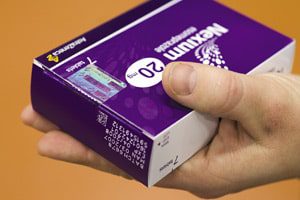
Some drugs widely used to control stomach acid may increase the risk of a serious vitamin deficiency, a new study suggests. A research team found that people who were diagnosed with vitamin B12 deficiency were more likely to be taking proton-pump inhibitors (PPIs) and histamine 2 receptor antagonists (H2RAs) than those who did not have […]
 Some drugs widely used to control stomach acid may increase the risk of a serious vitamin deficiency, a new study suggests.
Some drugs widely used to control stomach acid may increase the risk of a serious vitamin deficiency, a new study suggests.
A research team found that people who were diagnosed with vitamin B12 deficiency were more likely to be taking proton-pump inhibitors (PPIs) and histamine 2 receptor antagonists (H2RAs) than those who did not have the deficiency, Reuters reports. PPIs and H2RAs are used to treat acid reflux and peptic ulcers. Common PPIs include Prilosec (omeprazole), Nexium (esomeprazole), and Prevacid (lansoprazole); H2RAs include Tagamet (cimetidine), Pepcid (famotidine), and Zantac (ranitidine).
With too little vitamin B12, a person becomes tired, weak, constipated, and anemic, the U.S. National Institutes of Health explains. B12 deficiency can lead to nerve damage and dementia, according to Reuters.
The body absorbs B12 with the help of stomach acid and, because PPIs and H2RAs limit the stomach’s production of acid, the drugs could “theoretically increase the population’s risk of vitamin B12 deficiency,” the researchers write in the Journal of the American Medical Association (JAMA). Dr. Douglas Corley, the study’s senior author, said people should not stop their medications, according to Reuters. Dr. Corley, a gastroenterologist and researcher at the Kaiser Permanente Division of Research in Oakland, California, suggested that people taking these medications have their B12 level monitored.
The researchers compared the medical records of nearly 26,000 Northern California residents diagnosed with a vitamin B12 deficiency between 1997 and 2011, and nearly 185,000 people with healthy B12 levels, Reuters reports. Of those who were vitamin B12 deficient, 12 percent had been on PPIs for at least two years and about 4 percent were on H2RAs for an equally long period. Higher doses of the drugs were more strongly associated with deficiency than weaker ones, the researchers found, suggesting that people should use such medications for as short a time as possible and take the lowest effective dose.


